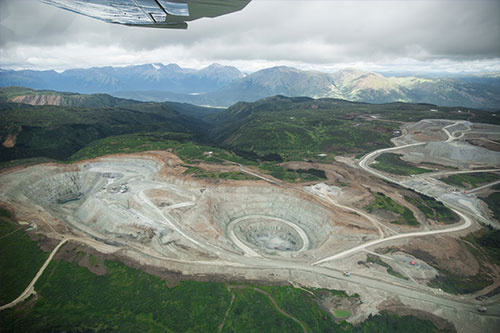
Letter Urges Canada, U.S. To Jointly Address British Columbia Transboundary Mining Pollution
April 27, 2020
“This letter highlights the inadequacies of British Columbia’s evaluation and permitting process for massive toxic waste dumps in major salmon-producing transboundary rivers, like the Taku, Stikine-Iskut, and Unuk-Nass river systems,” said Jill Weitz, director of Salmon Beyond Borders and one of the policy experts who co-authored the publication. “B.C.'s mine assessment process leaves Alaskans unprotected because it underestimates the risk of mine failures and contamination, and doesn’t rely on independent science.” The Taku, Stikine-Iskut, and Unuk-Nass are transboundary watersheds and home to world-class salmon rivers that originate in northwest B.C. and flow into Southeast Alaska. These iconic rivers and their watersheds have been centers of culture, commerce, and biodiversity for thousands of years and are the lifeblood of the numerous communities and nineteen federally recognized tribes of the region. Over two-dozen, large-scale Canadian mines are in some phase of development or operation at the headwaters of these rivers. Raymond Paddock, environmental coordinator for the Central Council of the Tlingit and Haida Indian Tribes of Alaska (Tlingit & Haida) said, “This letter validates the concerns of our Tribes in Southeast Alaska as well as our ongoing request for increased federal engagement from Canada, the United States, and Indigenous governments. We must work together to better understand and manage the proposed, existing and abandoned mines in our shared rivers.” Tlingit & Haida has called on the U.S. federal government for action under the Boundary Waters Treaty and to meaningfully engage the tribes of Southeast Alaska. In 2015, Tlingit & Haida began working to collect baseline water quality data, sediment sampling and water quality surveys on the Taku and Stikine Rivers. In 2018, Tlingit & Haida expanded their scope to sampling on the Alsek River near Yakutat, and in 2019, they added the Chilkat and Klehini Rivers outside of Klukwan and Haines. Tlingit & Haida has invited the tribes of the communities where sampling is occuring to create opportunities for these communities to develop their own capacity to conduct water quality sampling as well. This collaboration has allowed for capacity development, offset costs, share resources and develop and enhance partnerships within Southeast Alaska. Tlingit & Haida would like to see this type of relationship development with First Nations in British Columbia as well. The authors of the Science letter conclude that the persistent problem of mine contamination flowing across the international boundary violates the Canada-U.S. Boundary Waters Treaty of 1909, which states that “waters flowing across the boundary shall not be polluted on either side to the injury of health or property on the other.” “Thousands of Americans, including Tribes and members of Congress, as well as current and former U.S. governors, have urged the U.S. Department of State and Global Affairs Canada to enforce the Boundary Waters Treaty and to involve the International Joint Commission so that we can all work together to protect clean water and our way of life. We cannot ignore the science any longer!” said Tis Peterman, executive director of Southeast Alaska Indigenous Transboundary Commission (SEITC). As eight U.S. Senators stated in a June 2019 bipartisan letter to B.C. Premier John Horgan, “Indigenous peoples whose lands are affected by past, present and proposed mines near transboundary rivers have voiced concern and requested that the U.S. and Canadian governments undertake cumulative assessments of impacts to communities, cultural and natural resources, as well as the enforcement of the Boundary Waters Treaty of 1909.”
On The Web:
Edited By Mary Kauffman, SitNews
Source of News:
|
||||
